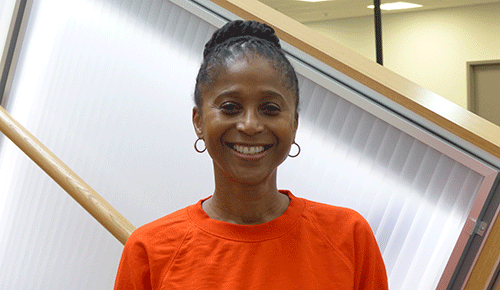
Deliwe Ngwezi is graduating with a PhD in medical sciences - pediatrics and plans to take her new knowledge in fetal cardiology back to her native South Africa.
They may not have donned their cap and gown yet, but this fall's graduates from the Department of Pediatrics are already putting their education to work. Here's what a few of the graduates are up to:
Mapping out birth outcomes
Charlene Nielsen completed an interdisciplinary PhD in the Department of Pediatrics and the Department of Earth and Atmospheric Sciences. Nielsen, who is a geographer, focused her research on mapping out adverse birth outcomes and potential environmental hazards in Canada.
She worked on the Data Mining and Neonatal Outcomes project with a team of graduate students from Computer Science, the School of Public Health and those with knowledge translation experience, along with supervisors Alvaro Osornio Vargas and Carl Amrhein. Although adverse birth outcomes are a multi-factorial problem, the research concluded that environmental factors were relevant based in location. She is currently completing a post doctorate in the Department of Pediatrics.
Improving lives for children with congenital heart disease
Argentina native M. Florencia Ricci was accepted for a clinical fellowship in Developmental Pediatrics at the University of Alberta. Following this fellowship, she was the recipient of the two-year Swallow Fellowship in Outcomes Research within the Division of Developmental Pediatrics.
Ricci was then awarded the Deloitte/Stollery Children's Hospital Foundation Clinical Research Fellowship Award. Ricci studied how acute diseases affect children's development. Following her fellowships, she pursued her PhD. Her PhD has helped her understand how to improve outcomes for children with congenital heart disease. She is now based in Winnipeg as an assistant professor in the Department of Pediatrics and Child Health at the University of Manitoba.
Finding a path to expand knowledge
Deliwe Ngwezi is a pediatric cardiologist trained at the University of Witwatersrand in South Africa. Like many pediatric cardiologists all over the world, she was often confronted by heartbroken families who asked why a heart defect occurred in their child. These challenging questions led her to seek opportunities for training in fetal cardiology to detect heart anomalies prenatally and to conduct research on etiologies of congenital heart defects (CHD). South Africa is a country with suboptimal pediatric cardiology services due to a lack of strong academic programs, research capacity and very few trained pediatric cardiologists.
In 2011, she embraced an opportunity to pursue doctoral studies and clinical fellowship in fetal cardiology at the University of Alberta under the supervision of Lisa Hornberger and Alvaro Osornio-Vargas. Her research investigated the role of industrial air emissions, socioeconomic status (SES) and the development of CHD using geographic information systems in Alberta. Her study found associations between maternal exposures to high levels of mixtures of chemicals, low SES and CHD development. Ngwezi plans to return to South Africa where she wants to fulfill her ambition to practice as a clinician-scientist.